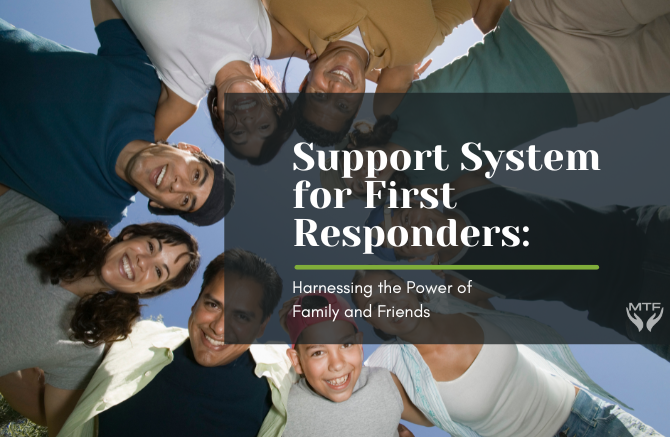Support System for First Responders: Harnessing the Power of Family and Friends
Discover the importance of a strong support system for first responders and how they can find solace in the love and understanding of their family...
6 min read
 Chris Smetana, AS, FP-C, CCP-C, NRP | Founder/President
:
Jan 25, 2024
Chris Smetana, AS, FP-C, CCP-C, NRP | Founder/President
:
Jan 25, 2024
-1.png)
Discover effective ways for air medical crews and the first responder community to heal after experiencing an air medical crash or a tragic event. This blog post explores various tips for recovery, coping with grief, supporting fellow crew members, and providing assistance to the families of those who lost their lives.
Air medical crashes can have a profound and long-lasting impact on the crews and first responders involved. These events are often traumatic and can lead to significant emotional distress, including the development of post-traumatic stress disorder (PTSD) and other mental health issues. It is crucial to recognize and understand the unique challenges that air medical crews and first responders face in the aftermath of such a crash.
The nature of their work, which involves high-stress situations and the formation of close-knit relationships among crew members, can intensify the emotional toll of losing a colleague or witnessing a tragic event. The physical and emotional scars left by responding to air medical crashes can have a lasting impact on the mental well-being of these individuals. Therefore, it is vital to provide them with the necessary support and resources to navigate the healing process.
In order to effectively cope with grief and trauma, it is important to allow oneself to grieve and experience the full range of emotions that come with such a loss. This includes acknowledging feelings of sadness, anger, guilt, or confusion. Seeking professional help from a mental health specialist who specializes in trauma or grief counseling can also be immensely beneficial. They can provide guidance and techniques to help individuals cope with the emotional impact of the crash.
Additionally, connecting with support networks such as fellow crew members, friends, and family is crucial. Sharing experiences and feelings with others who have gone through similar situations can provide a sense of understanding and support. Engaging in self-care activities is also essential for healing. Taking care of physical and mental well-being through exercise, nutritious meals, adequate sleep, and prioritizing self-care can help individuals navigate the healing process.
Journaling can be a therapeutic way to process feelings and gain clarity. By writing down thoughts and emotions, individuals can explore their grief in a structured and reflective manner.
It is equally important to honor and remember the lives of those lost in an air medical crash. Creating a memorial or tribute, either physically or digitally, can help ensure that their legacies are remembered. Participating in memorial events or ceremonies dedicated to the fallen can also provide an opportunity for connection and support among crew members, families, and the larger community. Sharing stories and memories of the fallen can keep their memory alive and provide comfort to those grieving.
Supporting fellow crew members is crucial in building resilience as a team. Open and honest communication, establishing peer support programs, and organizing debriefing sessions after a traumatic event are all important steps in supporting crew members. Creating a work environment that promotes psychological safety, empathy, and teamwork is also crucial. Providing resources for mental health support and implementing wellness programs can contribute to the overall well-being of the team.
Extending support to the families of those killed in an air medical crash is equally important. Offering emotional support, connecting them with counseling services, assisting with practical matters, and maintaining regular communication can help families navigate their own healing journeys.
It is crucial to recognize the unique challenges they face and provide them with support and resources to navigate the healing process. Coping with grief and trauma, honoring and remembering the fallen, supporting fellow crew members, and extending support to the families are all essential steps in the healing journey after an air medical crash. By actively addressing these aspects, the air medical community can work towards healing and resilience.
-1.png?width=300&height=196&name=MTFL%20%20Blog%20Hero%20Image%20(37)-1.png)
Grieving and healing after an air medical crash is a complex and individual process. Here are some tips to support emotional healing:
Allow yourself to grieve: It is essential to give yourself permission to experience and express your emotions. Acknowledge your feelings of sadness, anger, guilt, or confusion.
Seek professional help: Consider reaching out to a mental health professional who specializes in trauma or grief counseling. They can provide guidance and techniques to cope with the emotional impact of the crash.
Connect with support networks: Lean on your fellow crew members, friends, and family for support. Sharing your experiences and feelings with others who understand can be immensely helpful.
Practice self-care: Take care of your physical and mental well-being by engaging in activities that bring you joy and relaxation. Exercise, eat nutritious meals, get enough sleep, and prioritize self-care.
Journaling: Writing down your thoughts and emotions can be a therapeutic way to process your feelings and gain clarity.
Remember, everyone grieves differently, and there is no right or wrong way to heal. Give yourself time and be patient with yourself as you navigate this journey.
-1.png?width=300&height=196&name=MTFL%20%20Blog%20Hero%20Image%20(38)-1.png)
Honoring and remembering the fallen is an important part of the healing process after an air medical crash. It allows us to pay tribute to the lives that were lost and ensure that their legacies are never forgotten. Here are some additional ways to carry their memory forward:
Create a memorial: Establishing a memorial or tribute is a powerful way to honor the lives of those who were lost. Consider creating a physical memorial at your air medical base, such as a plaque or a dedicated space for reflection. Alternatively, you can create a digital tribute on your organization's website or social media platforms. This can include photos, stories, and messages from colleagues and loved ones.
Participate in memorial events: Attending memorial events or ceremonies dedicated to the fallen is a meaningful way to show support and connect with others who share in the grief. These gatherings provide an opportunity to come together as a community, share memories, and find solace in the collective support of fellow crew members, families, and the larger community.
Share stories and memories: Keeping the memories of the fallen alive is a powerful way to honor their lives. Encourage team members to share stories, anecdotes, and fond memories during team meetings or gatherings. Alternatively, you can create a dedicated space, such as a memorial book or an online platform, where crew members, families, and friends can contribute their stories and memories. This not only keeps their memory alive but also provides comfort to those grieving.
Support their families: Offering support to the families of those who were killed in the crash is essential. Reach out to them and let them know that they are not alone in their grief. Provide emotional support by being there to listen, offering words of comfort, and validating their feelings. Additionally, you can assist them with practical matters, such as funeral arrangements or connecting them with relevant resources. Maintaining regular communication with the families, even after some time has passed, shows them that their loved ones are not forgotten and that their well-being is still a priority.
By actively honoring and remembering the fallen, we ensure that their contributions to the air medical community are never forgotten. Their dedication and sacrifice continue to inspire us and remind us of the importance of our work. Let us come together as a community, support one another, and carry their memory forward with love, respect, and gratitude.
-1.png?width=300&height=196&name=MTFL%20%20Blog%20Hero%20Image%20(39)-1.png)
Building resilience as a team is crucial in the healing process following an air medical crash. Here are some ways to support fellow crew members:
Communicate openly: Encourage open and honest communication among team members. Create a safe space for everyone to share their thoughts, feelings, and concerns.
Provide peer support: Establish a peer support program within your organization. This can involve trained peer supporters who can offer emotional support and guidance to their colleagues.
Conduct debriefings: Organize debriefing sessions after a traumatic event. These sessions allow crew members to process their emotions, discuss their experiences, and seek support from one another.
Foster a supportive work environment: Create a work environment that promotes psychological safety, empathy, and teamwork. Encourage collaboration, provide resources for mental health support, and implement wellness programs.
By coming together as a team and supporting one another, you can build resilience and strengthen the bonds within your air medical crew.
-1.png?width=300&height=196&name=MTFL%20%20Blog%20Hero%20Image%20(40)-1.png)
Providing support to the families of those killed in an air medical crash is crucial for their healing and recovery. Here are some resources and ways to offer assistance:
Offer emotional support: Reach out to the families and let them know that you are there for them. Provide a listening ear, offer words of comfort, and validate their feelings.
Connect them with counseling services: Help the families access grief counseling or therapy services to support their emotional well-being. Provide them with information about local support groups and mental health professionals.
Assist with practical matters: Offer assistance with practical matters such as funeral arrangements, financial support, or connecting them with relevant resources.
Maintain regular communication: Stay in touch with the families even after some time has passed. Check-in on them periodically to see how they are doing and offer ongoing support.
Remember that the healing journey for the families will be long and challenging. By extending your support, you can help them navigate through this difficult time and find solace in knowing that they are not alone.
-1.png?width=300&height=196&name=MTFL%20%20Blog%20Hero%20Image%20(42)-1.png)
Explore many valuable First Responder Mental Health and Wellness resources on Mind the Frontline's online platform. Discover the link below to access a wide range of support and information tailored specifically for first responders.
Additional Mind the Frontline Resource's
Stay connected with Mind the Frontline on Facebook & LinkedIn.

To those who wish to help make a difference,
At Mind the Frontline, we are on a mission to make a positive impact on the mental health and well-being of our courageous first responders. Our non-profit organization is dedicated to fostering resilience and empowerment through critical conversations, valuable resources, and unwavering advocacy.
Now, we need your support to further our cause.
Every contribution to our "Help Us Help Them" campaign plays a crucial role in providing essential resources, support systems, and advocacy initiatives for those who dedicate their lives to serving our communities.
Your generous donation will directly contribute to creating a healthier and more supportive environment for our first responders. Together, let's stand by those who selflessly stand by us every day. Your support matters!!!
Donate today to make a lasting impact on the well-being of our first responders.
👉 JUST CLICK ON THE GREEN DONATE BUTTON 🙏
Thank you for being a vital part of our mission!
With gratitude,
The Mind the Frontline Team
" Together We Rise, Alone We Fall "

Discover the importance of a strong support system for first responders and how they can find solace in the love and understanding of their family...
-2.png)
Discover effective strategies for first responders to recover from traumatic events and build resilience.
.png)
Discover why corporate Employee Assistance Programs (EAP) fail to adequately support first responders and explore alternative solutions to address...